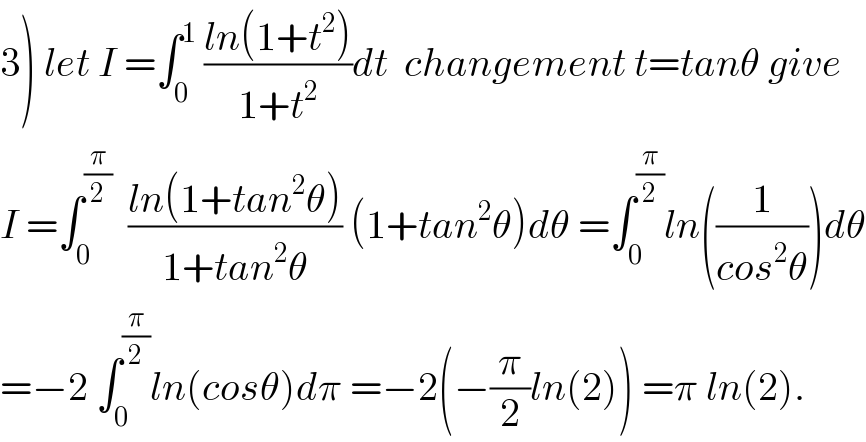
Question Number 48497 by maxmathsup by imad last updated on 24/Nov/18

$${let}\:{f}\left({x}\right)=\int_{\mathrm{0}} ^{\mathrm{1}} \:\:\frac{{ln}\left(\mathrm{1}+{xt}^{\mathrm{2}} \right)}{\mathrm{1}+{t}^{\mathrm{2}} }{dt} \\ $$$$\left.\mathrm{1}\right)\:{find}\:{a}\:{xplicit}\:{form}\:{of}\:{f}\left({x}\right) \\ $$$$\left.\mathrm{2}\right)\:{developp}\:{f}\:{at}\:{integr}\:{serie}\: \\ $$$$\left.\mathrm{3}\right){find}\:{the}\:{value}\:{of}\:\int_{\mathrm{0}} ^{\mathrm{1}} \:\frac{{ln}\left(\mathrm{1}+{t}^{\mathrm{2}} \right)}{\mathrm{1}+{t}^{\mathrm{2}} }{dt} \\ $$$$\left.\mathrm{4}\right){find}\:{the}\:{value}\:{of}\:\int_{\mathrm{0}} ^{\mathrm{1}} \:\frac{{ln}\left(\mathrm{1}+\mathrm{2}{t}^{\mathrm{2}} \right)}{\mathrm{1}+{t}^{\mathrm{2}} }{dt} \\ $$$$ \\ $$
Commented by maxmathsup by imad last updated on 26/Nov/18

$$\left.\mathrm{1}\right)\:{we}\:{have}\:{f}^{'} \left({x}\right)=\int_{\mathrm{0}} ^{\mathrm{1}} \:\frac{{t}^{\mathrm{2}} }{\left(\mathrm{1}+{xt}^{\mathrm{2}} \right)\left(\mathrm{1}+{t}^{\mathrm{2}} \right)}{dt}\:\:{let}\:{decompose}\:{F}\left({t}\right)=\frac{{t}^{\mathrm{2}} }{\left(\mathrm{1}+{xt}^{\mathrm{2}} \right)\left(\mathrm{1}+{t}^{\mathrm{2}} \right)} \\ $$$${case}\:\mathrm{1}\:\:\:{if}\:{x}>\mathrm{0}\:\Rightarrow{F}\left({x}\right)=\frac{{at}\:+{b}}{\left(\mathrm{1}+{xt}^{\mathrm{2}} \right)}\:+\frac{{ct}\:+{d}}{\mathrm{1}+{t}^{\mathrm{2}} } \\ $$$${F}\left(−{x}\right)\:={F}\left({x}\right)\Rightarrow\frac{−{at}\:\:+{b}}{\mathrm{1}+{xt}^{\mathrm{2}} }\:\:+\frac{−{ct}\:+{d}}{\mathrm{1}+{t}^{\mathrm{2}} }\:=\frac{{at}\:+{b}}{\mathrm{1}+{xt}^{\mathrm{2}} }\:+\frac{{ct}\:+{d}}{\mathrm{1}+{t}^{\mathrm{2}} }\:\Rightarrow \\ $$$${a}=\mathrm{0}\:{and}\:{c}\:=\mathrm{0}\:\Rightarrow{F}\left({x}\right)=\frac{{b}}{\mathrm{1}+{xt}^{\mathrm{2}} }\:+\frac{{d}}{\mathrm{1}+{t}^{\mathrm{2}} } \\ $$$${lim}_{{t}\rightarrow+\infty} \:{t}^{\mathrm{2}} \:{F}\left({t}\right)=\frac{\mathrm{1}}{{x}}\:=\frac{{b}}{{x}}\:+{d}\:\Rightarrow\mathrm{1}\:={b}\:+{xd}\: \\ $$$${F}\left(\mathrm{0}\right)=\mathrm{0}\:={b}+{d}\:\Rightarrow{d}\:=−{b}\:\Rightarrow\mathrm{1}={b}−{xb}\:=\left(\mathrm{1}−{x}\right){b}\:\Rightarrow{b}=\frac{\mathrm{1}}{\mathrm{1}−{x}}\:{and}\:{d}=−\frac{\mathrm{1}}{\mathrm{1}−{x}} \\ $$$${F}\left({t}\right)\:=\:\frac{\mathrm{1}}{\left(\mathrm{1}−{x}\right)}\left\{\frac{\mathrm{1}}{\mathrm{1}+{xt}^{\mathrm{2}} }\:−\frac{\mathrm{1}}{\mathrm{1}+{t}^{\mathrm{2}} }\right\}\:\Rightarrow{f}\left({x}\right)=\frac{\mathrm{1}}{\mathrm{1}−{x}}\int_{\mathrm{0}} ^{\mathrm{1}} \:\:\frac{{dt}}{\mathrm{1}+{xt}^{\mathrm{2}} }\:−\frac{\mathrm{1}}{\mathrm{1}−{x}}\:\int_{\mathrm{0}} ^{\mathrm{1}} \:\:\frac{{dt}}{\mathrm{1}+{t}^{\mathrm{2}} } \\ $$$${but}\:\int_{\mathrm{0}} ^{\mathrm{1}} \:\:\:\frac{{dt}}{\mathrm{1}+{xt}^{\mathrm{2}} }\:=_{\sqrt{{x}}{t}\:={u}} \:\:\:\:\:\int_{\mathrm{0}} ^{\sqrt{{x}}} \:\:\:\:\:\frac{{du}}{\sqrt{{x}}\left(\mathrm{1}+{u}^{\mathrm{2}} \right)}\:=\frac{\mathrm{1}}{\sqrt{{x}}}\:{arctan}\left(\sqrt{{x}}\right)\:\Rightarrow \\ $$$${f}^{'} \left({x}\right)\:=\frac{{arctan}\left(\sqrt{{x}}\right)}{\left(\mathrm{1}−{x}\right)\sqrt{{x}}}\:\:−\frac{\pi}{\mathrm{4}\left(\mathrm{1}−{x}\right)}\:\Rightarrow{f}\left({x}\right)=\int_{\mathrm{0}} ^{{x}} \:\:\frac{{arctan}\left(\sqrt{{t}}\right)}{\left(\mathrm{1}−{t}\right)\sqrt{{t}}}{dt}+\frac{\pi}{\mathrm{4}}{ln}\mid\mathrm{1}−{x}\mid \\ $$$${changement}\:\sqrt{{t}}={u}\:{give}\:\int_{\mathrm{0}} ^{{x}} \:\frac{{arctan}\left(\sqrt{{t}}\right)}{\sqrt{{t}}\left(\mathrm{1}−{t}\right)}\:{dt}\:=\int_{\mathrm{0}} ^{\sqrt{{x}}} \:\:\frac{{arctan}\left({u}\right)}{{u}\left(\mathrm{1}−{u}^{\mathrm{2}} \right)}\left(\mathrm{2}{u}\right){du} \\ $$$$=\mathrm{2}\:\int_{\mathrm{0}} ^{\sqrt{{x}}} \:\:\:\frac{{arctan}\left({u}\right)}{\mathrm{1}−{u}^{\mathrm{2}} }\:{du}\:\Rightarrow{f}\left({x}\right)=\mathrm{2}\:\int_{\mathrm{0}} ^{\sqrt{{x}}} \:\:\frac{{arctan}\left({u}\right)}{\mathrm{1}−{u}^{\mathrm{2}} }{du}\:+\frac{\pi}{\mathrm{4}}{ln}\mid\mathrm{1}−{x}\mid\:\:\:\left({x}\neq\mathrm{1}\right) \\ $$
Commented by maxmathsup by imad last updated on 26/Nov/18

$${case}\:\mathrm{2}\:{x}<\mathrm{0}\:\Rightarrow{F}\left({x}\right)=\frac{{t}^{\mathrm{2}} }{\mathrm{1}−\left(\sqrt{−{x}}{t}\right)^{\mathrm{2}} \left(\mathrm{1}+{t}^{\mathrm{2}} \right)}\:=−\frac{{t}^{\mathrm{2}} }{\left(\sqrt{−{x}}{t}−\mathrm{1}\right)\left(\sqrt{−{x}}{t}\:+\mathrm{1}\right)\left({t}^{\mathrm{2}} \:+\mathrm{1}\right)} \\ $$$$\left.=\frac{{a}}{\left(\sqrt{−{x}}{t}−\mathrm{1}\right)}\:+\frac{{b}}{\sqrt{−{x}}{t}\:+\mathrm{1}}\:+\frac{{ct}\:+{d}}{{t}^{\mathrm{2}} \:+\mathrm{1}}\:\:\:\Rightarrow{f}\left({x}\right)=\frac{{a}}{\sqrt{−{x}}}{ln}\mid\sqrt{−{x}}{t}+\mathrm{1}\mid+\frac{{b}}{\sqrt{−{x}}}{ln}\mid\sqrt{−{x}}{t}+\mathrm{1}\right) \\ $$$$+\frac{{c}}{\mathrm{2}}{ln}\left({t}^{\mathrm{2}} \:+\mathrm{1}\right)\:+{d}\:{arctant}\:\:+{c}.... \\ $$
Commented by maxmathsup by imad last updated on 26/Nov/18
![2) we have f(x)=∫_0 ^1 ln(1+xt^2 )(Σ_(n=0) ^∞ (−1)^n t^(2n) )dt =Σ_(n=0) ^∞ (−1)^n ∫_0 ^1 t^(2n) ln(1+xt^2 )dt =Σ_(n=0) ^∞ (−1)^n A_n by parts A_n =∫_0 ^1 t^(2n) ln(1+xt^2 )dt =[(1/(2n+1))t^(2n+1) ln(1+xt^2 )]_(t=0) ^1 −∫_0 ^1 (1/(2n+1))t^(2n+1) ((2xt)/(1+xt^2 ))dt =((ln(1+x))/(2n+1)) −((2x)/(2n+1)) ∫_0 ^1 (t^(2n+2) /(1+xt^2 )) dt but ∫_0 ^1 (t^(2n+2) /(1+xt^2 )) dt =_((√x)t=u) ∫_0 ^(√x) (u^(2n+2) /(x^(n+1) (1+u^2 ))) (du/(√x)) =(1/(x^(n+1) (√x))) ∫_0 ^(√x) (u^(2n+2) /(u^2 +1)) du and changement u=tanθ give ∫_0 ^(√x) (u^(2n+2) /(u^2 +1)) du =∫_0 ^(arctan((√x))) ((tan^(2n+2) θ)/(1+tan^2 θ)) (1+tan^2 θ) =∫_0 ^(arctan((√x))) tan^(2n+2) θ dθ be continued...](Q48636.png)
$$\left.\mathrm{2}\right)\:{we}\:{have}\:{f}\left({x}\right)=\int_{\mathrm{0}} ^{\mathrm{1}} \:{ln}\left(\mathrm{1}+{xt}^{\mathrm{2}} \right)\left(\sum_{{n}=\mathrm{0}} ^{\infty} \left(−\mathrm{1}\right)^{{n}} {t}^{\mathrm{2}{n}} \right){dt} \\ $$$$=\sum_{{n}=\mathrm{0}} ^{\infty} \:\left(−\mathrm{1}\right)^{{n}} \:\int_{\mathrm{0}} ^{\mathrm{1}} {t}^{\mathrm{2}{n}} {ln}\left(\mathrm{1}+{xt}^{\mathrm{2}} \right){dt}\:=\sum_{{n}=\mathrm{0}} ^{\infty} \left(−\mathrm{1}\right)^{{n}} \:{A}_{{n}} \:\:\:{by}\:{parts} \\ $$$${A}_{{n}} =\int_{\mathrm{0}} ^{\mathrm{1}} \:{t}^{\mathrm{2}{n}} {ln}\left(\mathrm{1}+{xt}^{\mathrm{2}} \right){dt}\:=\left[\frac{\mathrm{1}}{\mathrm{2}{n}+\mathrm{1}}{t}^{\mathrm{2}{n}+\mathrm{1}} {ln}\left(\mathrm{1}+{xt}^{\mathrm{2}} \right)\right]_{{t}=\mathrm{0}} ^{\mathrm{1}} \:−\int_{\mathrm{0}} ^{\mathrm{1}} \:\frac{\mathrm{1}}{\mathrm{2}{n}+\mathrm{1}}{t}^{\mathrm{2}{n}+\mathrm{1}} \:\frac{\mathrm{2}{xt}}{\mathrm{1}+{xt}^{\mathrm{2}} }{dt} \\ $$$$=\frac{{ln}\left(\mathrm{1}+{x}\right)}{\mathrm{2}{n}+\mathrm{1}}\:−\frac{\mathrm{2}{x}}{\mathrm{2}{n}+\mathrm{1}}\:\int_{\mathrm{0}} ^{\mathrm{1}} \:\:\frac{{t}^{\mathrm{2}{n}+\mathrm{2}} }{\mathrm{1}+{xt}^{\mathrm{2}} }\:{dt}\:{but}\: \\ $$$$\int_{\mathrm{0}} ^{\mathrm{1}} \:\:\frac{{t}^{\mathrm{2}{n}+\mathrm{2}} }{\mathrm{1}+{xt}^{\mathrm{2}} }\:{dt}\:=_{\sqrt{{x}}{t}={u}} \:\:\:\int_{\mathrm{0}} ^{\sqrt{{x}}} \:\:\:\:\:\frac{{u}^{\mathrm{2}{n}+\mathrm{2}} }{{x}^{{n}+\mathrm{1}} \left(\mathrm{1}+{u}^{\mathrm{2}} \right)}\:\frac{{du}}{\sqrt{{x}}} \\ $$$$=\frac{\mathrm{1}}{{x}^{{n}+\mathrm{1}} \sqrt{{x}}}\:\int_{\mathrm{0}} ^{\sqrt{{x}}} \:\:\:\frac{{u}^{\mathrm{2}{n}+\mathrm{2}} }{{u}^{\mathrm{2}} \:+\mathrm{1}}\:{du}\:\:{and}\:{changement}\:{u}={tan}\theta\:{give} \\ $$$$\int_{\mathrm{0}} ^{\sqrt{{x}}} \:\:\frac{{u}^{\mathrm{2}{n}+\mathrm{2}} }{{u}^{\mathrm{2}} \:+\mathrm{1}}\:{du}\:=\int_{\mathrm{0}} ^{{arctan}\left(\sqrt{{x}}\right)} \:\:\frac{{tan}^{\mathrm{2}{n}+\mathrm{2}} \theta}{\mathrm{1}+{tan}^{\mathrm{2}} \theta}\:\left(\mathrm{1}+{tan}^{\mathrm{2}} \theta\right)\:=\int_{\mathrm{0}} ^{{arctan}\left(\sqrt{{x}}\right)} \:{tan}^{\mathrm{2}{n}+\mathrm{2}} \theta\:{d}\theta \\ $$$${be}\:{continued}... \\ $$
Commented by maxmathsup by imad last updated on 26/Nov/18

$$\left.\mathrm{3}\right)\:{let}\:{I}\:=\int_{\mathrm{0}} ^{\mathrm{1}} \:\frac{{ln}\left(\mathrm{1}+{t}^{\mathrm{2}} \right)}{\mathrm{1}+{t}^{\mathrm{2}} }{dt}\:\:{changement}\:{t}={tan}\theta\:{give} \\ $$$${I}\:=\int_{\mathrm{0}} ^{\frac{\pi}{\mathrm{2}}} \:\:\frac{{ln}\left(\mathrm{1}+{tan}^{\mathrm{2}} \theta\right)}{\mathrm{1}+{tan}^{\mathrm{2}} \theta}\:\left(\mathrm{1}+{tan}^{\mathrm{2}} \theta\right){d}\theta\:=\int_{\mathrm{0}} ^{\frac{\pi}{\mathrm{2}}} {ln}\left(\frac{\mathrm{1}}{{cos}^{\mathrm{2}} \theta}\right){d}\theta \\ $$$$=−\mathrm{2}\:\int_{\mathrm{0}} ^{\frac{\pi}{\mathrm{2}}} {ln}\left({cos}\theta\right){d}\pi\:=−\mathrm{2}\left(−\frac{\pi}{\mathrm{2}}{ln}\left(\mathrm{2}\right)\right)\:=\pi\:{ln}\left(\mathrm{2}\right). \\ $$
Commented by maxmathsup by imad last updated on 26/Nov/18

$$\left.\mathrm{4}\right)\:\int_{\mathrm{0}} ^{\mathrm{1}} \:\:\frac{{ln}\left(\mathrm{1}+\mathrm{2}{t}^{\mathrm{2}} \right)}{\mathrm{1}+{t}^{\mathrm{2}} }\:{dt}\:={f}\left(\mathrm{2}\right)\:=\mathrm{2}\:\int_{\mathrm{0}} ^{\sqrt{\mathrm{2}}} \:\:\frac{{arctan}\left({u}\right)}{\mathrm{1}−{u}^{\mathrm{2}} }\:{du}...{be}\:{continued}... \\ $$
